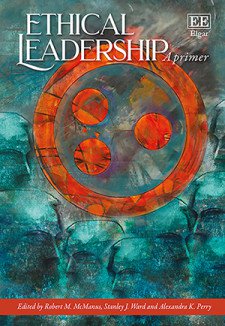
Presenters: Robert M. McManus, Stanley J. Ward, Alexandra Perry, Benjamin Dean, Austin D. Council, Maribeth Saleem-Tanner, Phyllis Sarkaria, and James N. Thomas
Date: 3 October 2019
Visit Amazon or your favorite bookstore to buy the book on which this webinar is based.
Requires Member Login.
Not a member?
Join today!
The world cries out for ethical leaders. While leadership programs may feature ethics as part of their training, the approach is often either simplistic or overly esoteric. Likewise, leadership and ethics are often treated as two distinct disciplines disconnected from one another. Ethical Leadership: A Primer connects ethics and leadership by providing an overview of several ethical frameworks, case studies, discussion questions, and additional resources.
The editors and contributors of Ethical Leadership will each use the Five Components of Leadership Model to highlight an approach to ethics that relates to leadership or an approach to leadership relates to ethics. Case studies and demonstrations will be shared and the webinar will include ample time for Q&A.
Participants will gain:
- An understanding of the ethical implications of particular approaches to leadership such as servant leadership, followership, and authentic leadership.
- Practical insight on the leadership implications for various approaches to ethics, including Kantianism, utilitarianism, and divine command theory.
- Compelling current examples that vividly illustrate the connection between ethics and leadership.
- An overview of how the Primer can be used with students and practitioners to help them understand and apply ethical leadership theories so they may accomplish their goals both effectively and ethically.
Speaker Information

Robert M. McManus is the McCoy Professor of Leadership Studies and Communication at the McDonough Center for Leadership and Business at Marietta College (Ohio). He is also the Chair of the Masters in Organizational Leadership Ethics Concentration at Claremont Lincoln University. He is the co-editor of Ethical Leadership: A Primer (Edward Elgar, 2018) and the co-author of Understanding Leadership: An Arts and Humanities Perspective (Routledge, 2015). His work has also appeared in the Journal of Leadership Studies and he served as a section editor for Leadership in Complex Worlds (Jossey-Bass). McManus has also served as the Chair of the Leadership Education Member Interest Group of the International Leadership Association. He regularly teaches classes on the foundations of leadership, organizational leadership, theories and models of leadership, and global leadership. He is an award-winning educator and has travelled extensively teaching on leadership in global contexts. His forthcoming book, Leadership and Communication: Theory and Practice, will be released in 2021 (Routledge). McManus holds a Ph.D. in Communication as well as a Master of Business Administration.

Stanley J. Ward holds a Ph.D. in Leadership Studies and serves as both the dean for capstone studies at Claremont Lincoln University (Claremont, California) and the director of CLU’s Center for Action Research, which promotes an action research model based on mindfulness, dialogue, and collaboration that lead to positive social changeWard previously served as an instructor and interim dean for the university’s Ethical Leadership program. Outside of his work in academia, Ward is founder and principal at Influence Coaching, providing both individual and team leadership development. His development model uses a variety of coaching and assessment tools to help leaders and teams maximize their strengths, correct their liabilities, and make peace with weaknesses. He is also a member of both the International Leadership Association and the International Coach Federation.

Alexandra Perry is the Assistant Professor of Leadership and Ethics at the McDonough Center for Leadership and Business at Marietta College. She has also served as a Clinical Ethicist at OhioHealth, working at Grant Medical Center and Doctor’s Hospital in Columbus, Ohio. She holds a Master’s in Education and a Doctorate in Philosophy and Pedagogy from Montclair State University, and trained in Clinical Ethics at INTEGRIS Health in Oklahoma. She has also worked for the sections of Adolescent Medicine, Pediatric Hospital Medicine, and Pediatric Palliative Care at the University of Oklahoma. She also spent time during her dissertation fellowship working with Japanese physicians on issues related to clinical ethics, including a nationally-funded project on organ donation and transplantation. Perry has published academic articles on leadership and medical ethics, and is the editor or author of five books relating to ethics: Ethical Leadership: A Primer, Ethics and Neurodiversity, The Moral Philosophy of Bernard Williams, Contemporary Japanese Bioethics, and Paper Cranes and Mushroom Clouds. Currently, Perry is writing a series of articles on advanced care planning for terminally-ill children in state custody and is also working on a book focused on leadership in healthcare.

Benjamin Dean serves on the university faculty of The Citadel, in Charleston, SC, where he is an associate professor in the Tommy and Victoria School of Business and a former head of the Department of Leadership Studies. He holds a Ph.D. in organizational leadership, and teaches in organizational development, human resources, and business law and ethics. His certifications include Senior Professional in Human Resources (SPHR), and the Senior Certified Professional certification by the Society of Human Resources Management (SHRM). He is a licensed attorney and certified mediator, having actively practiced in business law and civil litigation, and served on the White House staff as Assistant Counsel to the President. He has extensive organizational and global experience, and has worked in over thirty countries. He has authored journal articles and textbook chapters on organizations, leadership, law, and online education. He speaks and consults in leading organizational change and in human capital development.

Austin D. Council is a doctoral student at the University of Florida in the Department of Agricultural Education and Communication in Gainesville, Florida. Austin is also a teaching assistant and frequently assists in teaching undergraduate leadership courses. Austin was previously a middle school social studies teacher in Alachua, Florida before pursuing his PhD. His current research concentration is the relationship between the virtue of humility and leadership, more specifically, how leaders develop and cultivate humility for effective leadership. Austin holds a master’s degree in history from the University of Florida and is seeking a doctorate degree in agricultural education and communication with a concentration in leadership.

Maribeth Saleem-Tanner is the Director of Civic Engagement at the McDonough Center for Leadership and Business at Marietta College (Ohio). In this role, she oversees programs focused on nonprofit capacity building, campus community engagement, and student leadership development, and teaches classes on project planning, nonprofit board leadership, facilitation and deliberation, and innovative leadership. She has over a decade of experience working professionally in community-based nonprofits, and continues to be actively engaged in the sector as a board member, consultant, and volunteer. She holds an MA in conflict transformation with a concentration in peacebuilding and development from the Center for Justice and Peacebuilding at Eastern Mennonite University in Harrisonburg, Virginia, as well as a BA in English and creative writing from Pomona College.

Phyllis Sarkaria is a human capital executive, coach, and adviser and serves on the teaching faculty at Claremont Lincoln University. Before starting her consulting practice, Sarkaria was Vice President, Human Resources for Quidel Corporation, a leading manufacturer of medical diagnostic tests, where she oversaw the company’s global HR strategy and programs for over 12 years. In addition to human resources, Sarkaria has held financial analysis, strategic planning, and government affairs roles in industry, approaching leadership and ethics issues as an outcome-driven practitioner. Sarkaria earned a BBA in Finance and an MBA, both from Texas Tech University, and an MA in Ethical Leadership from Claremont Lincoln University. She holds SPHR, SHRM-SCP, CCP, and CEBS certifications, taught Extension courses in HR at the University of California, San Diego for almost a decade, and has spoken on a variety of topics at regulatory, leadership, and human resources forums.

James N. Thomas is the Senior Pastor at First Baptist Church in Fayetteville, Georgia. His fields of interest include evangelical theology, servant leadership, and Christian discipleship. He currently serves on the teaching faculty of The Bonhoeffer Project, a national, multi-denominational Christian ministry challenging pastors and ministry leaders to become disciple-making leaders in their organizations. He is also a teaching member of Project 70, a Brazilian Church Planting Partnership in Santa Caterina, Brazil and is a recurring guest lecturer at the Korean Baptist Theological University/Seminary in Daejeon, South Korea. He holds a Bachelor of Arts in Religion from Baylor University, a Master of Arts in Religious Education from Southwestern Baptist Theological Seminary in Fort Worth, Texas, and a Ph.D. in Leadership Studies from Dallas Baptist University.
Share this webinar:


